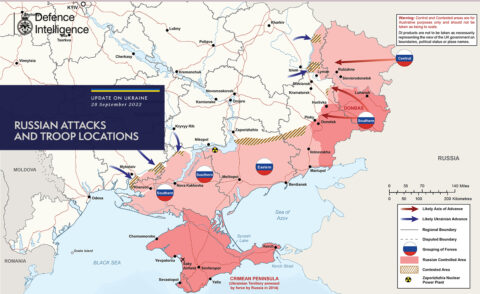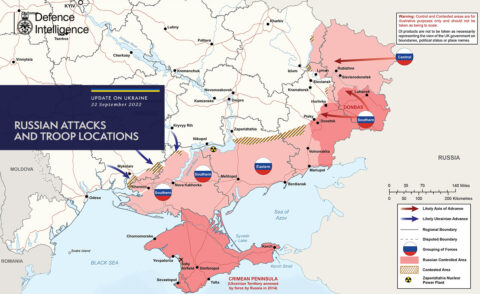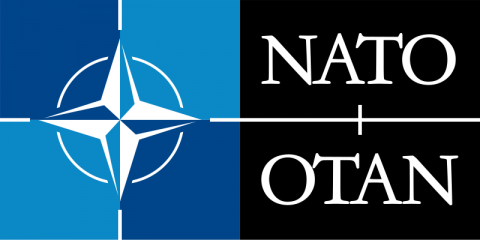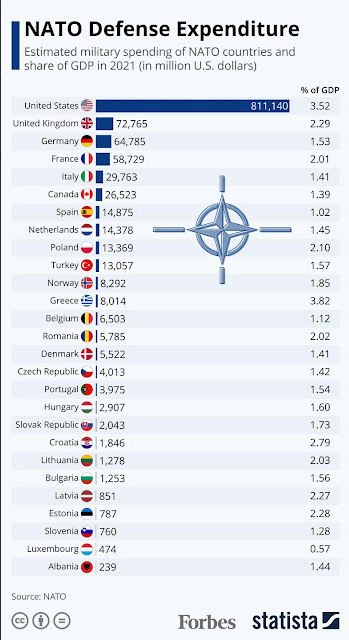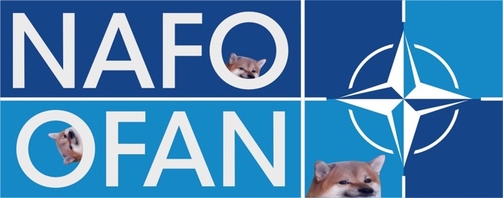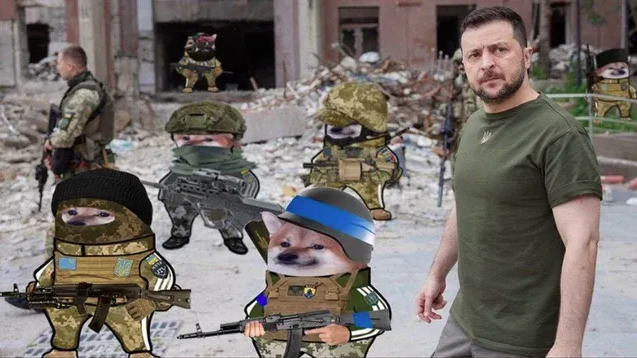World War Two
Published 8 Oct 2022The Germans booby-trapped Naples when they evacuated last week and local civilians now pay the price. In the Mediterranean, Kos falls to the Germans while Corsica is liberated by the French. There is action all along the Dnieper in the USSR, and the Australians advance in New Guinea, and the Japanese evacuate Vella Lavella in the Solomons.
(more…)
October 9, 2022
Could the Soviets Cut Off Crimea? – WW2 – 215 – October 8, 1943
October 7, 2022
The Combat Dogs of World War Two – WW2 Special
World War Two
Published 6 Oct 2022Where man goes, so does man’s best friend. Across the globe, tens of thousands of dogs are called up. They play their part in tales of heroism and joy. But without any agency over their own lives, they also experience fear, death, and cruelty.
October 6, 2022
This vehicle belongs in a museum. Why is it still being used in Ukraine?
Imperial War Museums
Published 5 Oct 2022The BMP-1 is a Soviet infantry fighting vehicle from the 1960s. Ours was captured during Operation Desert Storm in 1991 and has been on display at IWM Duxford for over 30 years. Yet vehicles just like It are still being used by both sides in the ongoing Russo-Ukrainian War, with heavy losses. So why are museum pieces being fielded in a 21st century war? And how are they performing?
(more…)
October 4, 2022
Sweden: The Jews’ Salvation? – WAH 080 – October 2, 1943
World War Two
Published 2 Oct 2022As the Allies advance in southern Italy, the people of Naples join them in fighting the Wehrmacht. In Denmark, the biggest rescue operation of Jews thus far begins.
(more…)
October 3, 2022
“We’re one breaking news alert from seeing a day’s work dramatically reduced in importance, if not rendered obsolete forever”
It’s a very weird moment in time, as The Line‘s weekly editorial wrap-up notes:
This is perhaps the strangest dispatch we’ve ever written. It is a fact of life in the news business that top headline can change in an instant. We’re one breaking news alert from seeing a day’s work dramatically reduced in importance, if not rendered obsolete forever. Every journalist has known that frustration. And today, as Western officials remain concerned about the risk of nuclear attack, this seems more true than usual. All our little insights into Canadian politics and cultural issues would make a weird second and third item in a dispatch where the lead item was Kyiv going up in a mushroom cloud.
So yes. This is where our minds are. As discussed at some length in our podcast and video this week, your Line editors have been closely watching developments in the war between Ukraine and Russia, and indeed take very seriously threats by the Russians to use nuclear weapons. We understand fully that it is very possible that all of Putin’s talk of nukes is a bluff, intended to rattle the West and encourage Ukraine to accept Russian gains and negotiate.
Neither seems likely — Ukraine is motivated and Western support, though imperfect, remains strong. We also see little indication that Putin could win the war in which he has stranded himself and his country, and we believe that things will only get worse for him. His attempt to mobilize 300,000 has turned into an item of mockery abroad, as pictures of old men and rusted equipment spread across social media. The “annexation” of occupied areas into Russia clearly didn’t deter either Ukraine or its Western backers; Ukraine’s forces remain on the move, with more Western weapons arriving all the time. And meanwhile, on the battlefield, the Ukrainian Armed Forces grow ever stronger: in just the last few hours, they have handed the Russians another embarrassing defeat in the city of Lyman. That city, a local rail junction, was important for Putin’s logistical efforts in the region, and fell into Ukrainian hands with a shocking lack of resistance.
See what we mean? This isn’t going well for Russia, and everything he tries is just stranding Putin deeper in the shit. He could have de-escalated this war at several points. At every juncture he has chosen escalation instead, and that has only made his problems worse — more deaths, more unrest, more humiliation. All of his efforts to intimidate the West or crush the Ukrainians have failed. What can he do? How can he get himself out of this problem? What will happen to him if he can’t?
These are the questions keeping us up at night. Seeing the conflict through his eyes, it’s not hard for us to imagine that Putin will come to view some kind of nuclear use as his only remaining chance to escape this war with his power still in place, or perhaps even simply with his life. After all, all this talk about whether Putin is “rational” depends entirely on how he understands his own circumstances. What may seem insane to us may, in fact, make perfect sense to him, and we suspect one’s definition of reason undergoes a radical re-evaluation when one feels a noose getting ever-tighter around the throat.
So that’s why we think it’s possible. Let’s talk what we think is possible. There are a few different ways he could use nuclear weapons. We are not the experts on this, but your Line editors are, if nothing else, reasonably well read on the topic, and we have spent the last few weeks talking with genuine experts. If we do see the use of a nuclear weapon, Putin could use a single small device on a minor target in Ukraine (or perhaps over the Black Sea) in hopes of shocking NATO and the world through his sheer willingness to break the nuclear taboo. We would expect him to go a bit further, and hit Ukraine with a series of small strikes intended to disrupt its military and seize some kind of conventional military advantage on the ground, on top of the political shock.
Or hey: he could go fully insane and try to terrorize the world into bending to his will by, for instance, attacking NATO directly, or using one of his larger nuclear weapons to utterly destroy a city in Ukraine.
October 2, 2022
Smolensk and Naples Liberated! Both in ruins – WW2 – 214 – October 1, 1943
World War Two
Published 1 Oct 2022Major prizes are taken by the Allies this week on two fronts — Naples in Italy and Smolensk in the USSR, but they are advancing all over the Eastern Front, across the Italian peninsula, and in the South Seas, but the enemy is leaving a trail of destruction as he pulls back.
(more…)
September 29, 2022
Considering weird possible scenarios in Ukraine
In The Line, Matt Gurney walks through some until recently unimaginable outcomes of the Russian invasion of Ukraine:
It’s probably time for us to start thinking through some weird possible scenarios for what’s happening in Russia. Because the spectrum of what could happen is a lot broader than it seemed only six months ago.
But let’s start with an important exercise in accountability. In previous commentary, I predicted a lot of things well: that Ukrainian resistance would be very effective, that Russia would have major logistics problems, that the Russians would use mass artillery fire against civilians in place of military advances. I was quick to grasp that Ukraine was overperforming and that Russia was struggling early in the conflict.
But getting some details right didn’t help me avoid blowing the conclusion: I thought Russia would win. Not a total victory, but I thought Russia would seize a lot more of the country before its logistical problems and Ukrainian resistance brought their offensives to a halt, leaving Ukraine with some kind of rump state in the west. I certainly didn’t believe in February that Russia could lose, and I never would have believed that Ukraine could actually win on the battlefield, as it now seems more than capable of doing.
I don’t know if I underestimated Ukrainian capabilities, per se. I always expected them to fight bravely and well, and understood the lethality of modern man-portable weapons against tanks and armoured vehicles. It’s probably closer to the mark to say that I overestimated Russia’s capabilities — I was a cynic on their military and expected it to perform badly, but it’s somehow fallen well short of my already low expectations. It is absolutely delightful to be wrong on this one, but readers deserve the truth: I expected Russia’s military to perform better and grab a much bigger chunk of Ukraine before having to stop in the face of logistical dysfunction and Ukrainian resistance. Part of me wonders if the Russians themselves are surprised by how hollowed out their military had become.
With that on the record, let’s flash forward to the present. As noted above, Ukraine now seems fully able to win the war. As I write this, Ukrainian forces are on the move again in the northeast, and seem to be encircling Russian positions in occupied Lyman. If able to complete this latest manoeuvre, Ukrainian forces will cut off a large force of Russian troops and will also seize control of an important local rail junction, threatening Russian logistics (such as they are) in the surrounding area. Perhaps more importantly to the overall conduct of the war, Russia’s effort to mobilize 300,000 men for the war is running into obvious challenges. Men of military age are fleeing the country. Reports from Russia reveal that the army has little in the way of equipment and weapons for the new draftees, and no system in place to train them. There have been comically bizarre stories of infirm old men getting call-up notices, and of draftees being sent to the front after only a day or two of training … at best.
This isn’t a solution to Putin’s problems. It’s a new problem being created in real time. Even if Putin can find 300,000 men, it seems unlikely he can equip them, and even less likely that he can train them. Whether or not he can transport what men he does round up into the battle area is an open question, as is whether or not he can supply them once they get there.
This is the long way of saying something I’ll now just state bluntly: Russia is losing. Putin’s latest actions reveal that he knows he’s losing. If the mobilization flops, as seems likely, he’ll be losing even worse than he was losing before, and he’ll have damn few options to turn that around.
And this is why we need to start thinking through some weird scenarios.
September 28, 2022
Putin’s nuclear option may not be as decisive in Ukraine as many fear
Like almost everyone else, I’m still hopeful that the Russians will not resort to nuclear weapons as their invasion of Ukraine drags on and on — especially as it’s expected that any first use of nuclear weapons will trigger a global crisis or even a new world war. At Quora, John Mark McDonald offers his take on the issue that certainly doesn’t match what most pundits appear to believe:
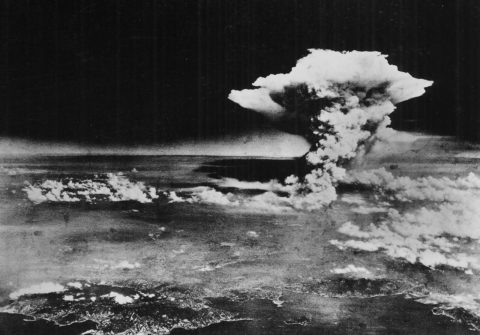
Atomic cloud over Hiroshima, taken from “Enola Gay” flying over Matsuyama, Shikoku, 6 August, 1945.
US Army Air Force photo via Wikimedia Commons.
As someone who has studied nuclear war for close to forty years now, I am going to give you an answer that will blow your mind. Even if the entire Russian nuclear arsenal were used against Ukraine, it wouldn’t substantially change the course of the war. How could I possibly say that? Because, the power of nuclear weapons has been used as a boogeyman for so long that the actual power of a nuclear detonation has almost no relation to their actual destructive power. No nuclear power can afford to actually use one in combat because it would expose the mythical nature of nuclear weapons.
Nuclear weapons are hyped to the point that no one contradicts it when a media outlet publishes a statement indicating that even a single nuclear device will destroy the world. This is a blatantly, stupidly, obviously untrue, but never corrected. After all, two were used in WWII. BUT that is just the tip of the iceburg. I thought there had been a couple of hundred nuclear test that prove this point. I was off by over an order of magnitude. There have been nearly THREE THOUSAND NUCLEAR DETONATIONS ALREADY, that are either known or suspected and this has not effected the survivability of life on Earth even slightly.
Well then, how dangerous are nuclear weapons? Nuclear weapons, if they weren’t their own catagory, would be classified as incendiary weapons. They set stuff on fire. They set a lot of stuff on fire. In fact they can set things on fire as far as two miles away from the actual detonation. Besides this, nuclear detonation are very bright, capable of blinding people 20–30 miles away. This is only constrained by the curvature of the earth. They also create hurricane force winds as the air around the detonation expands and contracts. If you are outside and unshielded and within a mile of a nuclear detonation, you are going to die.
The problem here is that Ukraine is really big. I mean the size of Texas big. Cities there tend to be spread out in modern times and their larger ones cover over a hundred square miles. The average nuclear detonation are only burn 2–3 square miles of territory. A city the size of Kiev would take on the order of 200 warheads to cover the whole thing.
Which brings us to our next point. Modern cities are just not that vulnerable to incendiaries. Modern city centers and industrial areas are made of concrete and steel. Most of the damage in Hiroshima and Nagasaki was done because almost all the buildings were made of wood and paper. The initial blast set the city centers on fire which spread and ended up burning down most of the city. Modern cities are just not that vulnerable. In Ukraine, despite millions of rounds of being poured into their cities, not one of them caught fire and burned to the ground like the Great Chicago or Great London Fires in the 19th century or the fire storms of WWII. In the Japanese nuclear detonations, the brick buildings were still standing, despite being much less sturdy than modern buildings. This leads to the most surprising revelation about nuclear detonations: If you are not outside, you stand a good chance of surviving even within the blast zone. Nuclear blasts are mainly line of sight killers. The vast majority of “radiation” created by an nuclear detonation is infrared radiation, or heat the same as a gas stove or fireplace makes. Unless the building you are in is collapsed by the wind or you fail to leave if it catches on fire or you happen to be in front of a window with a direct line of sight to the detonation, you are probably going to be fine.
Thus we get to the real reason why Putin will not use nuclear weapons: they’re just not all that effective compared to the boogeyman that is in our collective imaginations. Were a nuclear missile to detonate over central Kiev, no one would believe that it was an actual nuclear blast because the city is still there and all the major buildings are still standing.
Secondly, he doesn’t have very many of them. The numbers given for the Russian nuclear arsenal are an outright farce. You get that number by taking of bombs that the USSR claimed to have built, and subtract the number used in their testing program. This leaves you with about 9,000 warheads. First of all, Russia doesn’t have nearly enough delivery systems to put those warheads on. The second problem here is that nuclear warheads have a very short shelf life. Nuclear warheads require a detonator made of conventional explosives. These detonators are some of the most precision pieces of engineering in the history of mankind. A series of explosives has to go off in such a way that the core is hit by the same amount of pressure from all directions simultaneously. If any of those explosives are even slightly off, the nuclear warhead will not go off. You now have an extremely precise machine sitting around a core of material emiting hard radiation. Hard radiation is not friendly to machines. Nuclear warheads need to be rebuilt a least every five years and maintained a lot more often than that. Even with that, a twenty year old warhead is a piece of junk. It’s been more than twenty years since the Putin kleptocracy came to power. I’m sure that Russia has a number of Potemkin warheads that are kept in top shape for inspectors, but given the current Russian system, the Russian nuclear arsenal most likely resembles the Russian tank reserves: the bare minimum kept in service while the rest is a scrap pile.
Currently, the spector of the vast Russian nuclear arsenal is the last card he has in his hand. If he were to actually use it, it would expose that he never had anything but a junk hand and bluffing to back it up.
H/T to Never Yet Melted for the link.
CDR Salamander also looks at the nuclear question:
Some are looking closer at the nuclear option that Russia has. I think they are looking too hard. A good example of this line of concern was in yesterday’s WaPo by Joseph Cirincione.
NB: Before the pull quotes, a fair warning – Cirincione is selling a book titled, Nuclear Nightmares: Securing the World Before it is Too Late, so keep that in consideration;
Russian President Vladimir Putin is losing his war. If the Ukrainians continue to liberate areas of their country from his invading army, would he actually use nuclear weapons as he has threatened? If so, how? And what would the U.S. response be?
It is difficult to put percentages on risk. Nor does it really matter. Given the stakes, if the chances are 10 percent or 40 percent, the response would be the same: Minimize the possibility of nuclear use, and prepare responses in advance.
This is when I remind everyone that “we” are horrible at predicting the next war early enough to prevent them. The track record is simply not very good. However, Cirincione has invested a lot of time and effort in looking at this — so we should give his ideas some consideration;
The next quote reminded me of a little reminder a peer gave me back when I was a NATO staff weenie at the other end of the HQ p-way from him. As a JO, he was on the other side of the wire as an JO in the Warsaw Pact. “Americans may not follow their doctrine very well, but Russians do.”
Russian military writings describe in detail how, if Russia is losing a conflict, it could use nuclear weapons to force its enemy to retreat. This “escalate to de-escalate” or “escalate to win” strategy is somewhat controversial, but it is not dissimilar to various U.S. plans for using nuclear weapons first.
Well, sometimes we follow our doctrine. Sometimes the Russians don’t … but if you are playing odds …
I still stand by my belief — and that is a weak thread, I know — that in the next war, nuclear weapons will be what chemical weapons were during WWII. Everyone had them; no one used them.
If nuclear weapons were to appear on the Ukrainian stage, Cirincione does not have this COA as his most likely … but it is my most likely if one must choose from the “Nuke” basket;
Demonstration shot. One option is for Russia to fire a nuclear weapon over an uninhabited area — say, part of the Black Sea — as a demonstration of its seriousness in hopes that the West will back down. Some scientists involved in the Manhattan Project urged just such a demonstration shot as an alternative to bombing Japanese cities at the end of World War II. While no one would be killed and there would not be physical damage, the explosion would stop the world in its tracks. There has not been a nuclear weapon used in combat in 77 years. No one has even seen a nuclear explosion above ground since 1980.
This is their neighborhood and fallout will drift to their lands if nukes are used. Is anyone going to buy grain downwind? No. Next to underground explosions, explosions high over the water or in the atmosphere create the least secondary radiation effects. Don’t underestimate the lingering memory of Chernobyl. I see “Demonstration Shot” of the most likely COA of the least likely Nuke COAs.
As shocking as this would be, Russia would likely reject this option for the same reason U.S. military leaders did in 1945: It is not shocking enough.
Don’t agree. Russia believes their own FITREPs, so to speak. The arrogance of their initial OPLAN speaks to this. They hold most of Central and especially Western Europe in contempt. I am sure a nuke over the Black Sea would be shocking enough (and they’re right).
September 26, 2022
QotD: “Comrades of proven worth”
This would be funny if it wasn’t quite such a jarring reminder of how the Soviets used to manage matters. The revolutionary vanguard were not held to the same standards as everyone else because, you know, they were the revolutionary vanguard, leaders of the people. They thus got all the nice apartments in central Moscow as they had to be close to the Ministries where they directed the peasants. They didn’t have to share the apartment because they needed to rest after their labours. And surely those working for the workers should be well rewarded?
So too they didn’t have to line up for the scraps of whatever rotting junk the ration stores had. The KGB, for example, had its own commissary just around the back of Lubyanka – I know, I’ve shopped in it. And higher ranks simply never needed to go shopping at all, the nomenklatura had the government delivery service. Ocado for commies but only really important commies.
This all came under the rubric of comrades of proven worth…
Tim Worstall, “Emma Thompson Is A Comrade Of Proven Worth To Extinction Rebellion”, Continental Telegraph, 2019-04-19.
September 25, 2022
Red Army Reaches the Dnieper – WW2 – 213 – September 24, 1943
World War Two
Published 24 Sep 2022Benito Mussolini proclaims a new fascist republic in Italy, but this time it is a full puppet state to Germany. There is scattered fighting around Italy and the Dodecanese — including a massacre of Italian POWs, but the big Allied advances this week are the Australians in New Guinea and the Soviets retaking their own territory. They take ground, in fact, from near Smolensk all the way south to the Sea of Azov.
(more…)
September 23, 2022
Lessons from the Eighteenth Century for the Russo-Ukraine conflict
In Strategika, Edward Luttwak considers what lessons can be drawn from wars of the past to help inform the ongoing Russian invasion of Ukraine:
Every war must end, but no war need end quickly — neither world war makes it to the top ten in longevity. The nearest parallel to the Ukraine war – the Dutch War of Independence (1568–1648), fought between a smaller but more advanced nation, and the world-spanning Spanish Empire, the superpower of the age – persisted for eighty years because the Spanish kept losing, but there was so much ruination in that declining power.
In our own days, expeditionary wars fought against enemies far away who could hardly fire back, lasted for many years as the different war-ending theories promoted by fashionable generals were tried seriatim to no avail, till the day when evacuation was preferred even if utterly ignominious.
The eighteenth-century wars fought by rival European monarchs who could all converse in French with each other, were enviously admired in the bloody twentieth century, because they allowed much commerce and even tourism to persist — utterly unimaginable even in Napoleon’s wars, let alone the two world wars — and because they ended not in the utter exhaustion of the collapsing empires of 1918, nor in the infernal destructions of 1945, but instead by diplomatic arrangements politely negotiated in-between card games and balls. The 1763 Treaty of Paris that ended the Seven Years’ war and French America, inadvertently opening the way for the American republic, was not drafted by the victorious British Prime Minister Lord Bute, but by his very good friend the French foreign minister Étienne-François de Stainville, duc de Choiseul, who solved the three-way puzzle left by the French defeat by paying off Spain with Louisiana, Britain with money-losing Canada, and regaining the profitable sugar islands for France, which still has them.
And instead of the winners charging the losers with incurable bellicosity as Versailles did with Germany, or stringing them up individually as war criminals, as in the ending of twentieth-century wars, eighteenth-century winners were more likely to console the losers just short of “better-luck next time” — and in a century in which there was war every single year without exception from 1700 to 1800, if one war ended another necessarily started or at least persisted, allowing a “next time” soon enough.
By contrast, the ensuing nineteenth-century wars held no lessons at all for the twentieth century, which was equally bereft of a Napoleonic superman at the start and ample tropical lands easily conquered later on, while the Crimea expedition in the middle was mostly a counter-example of how not to wage war, and the Franco-Prussian war was just as sterile: all it proved was that there really was only one Helmuth von Moltke who could win wars by parsimonious force, unlike his homonymous nephew who lost a five-year war in its first five weeks; and that there really was only one Otto von Bismarck, who crowned his incomplete 1871 unification of German lands by refusing to complete it by unifying all Germans as the Italians were unified, lest the world combine to make a bigger Germany smaller.
Clearly only the eighteenth-century precedents apply to the Ukraine War. Neither Putin nor Zelensky speaks French but neither needs it to converse in their Russian mother-tongue, and if they do not actually talk (Putin demurely said that he could not possibly be expected to negotiate with Kiev’s drug addicts and Neo Nazis), their officials certainly can, and do so often.
When it comes to the persistence of commerce in war — the habit that Napoleon wanted to break with his Blocus Continental against British exports — every day Russian gas flows to the homes and factories of Ukraine on its way into Western Europe, with Ukraine transferring money to Russia every day, even as it attacks its faithful customer. And, Ukrainian wheat is now shipped past Russian navy vessels to reach the hungry Middle East, after a negotiation unthinkable in twentieth-century wars, or in Napoleon’s either.
In Russia, sanctions have certainly diminished easy access to imported luxuries in local franchised shops, but they still arrive via Turkey at a slight premium … or discount depending on the previous Moscow markup. All over Russia the sanctions have been felt in all sorts of ways because the country was actually more internationalized than anyone realized, including Putin no doubt (arriving in Tomsk at 0600 one winter morning at a temperature of minus infinity, the one place to eat was McDonalds).
But unlike China, which must choose between fighting and eating protein — some 90% of its chicken, pork, and beef is raised on imported cereals plus some 150 million metric tons of soya per annum from U.S. and Canadian Pacific ports, or the Atlantic ports of Brazil and Argentina that would be an ocean too far for China-bound vessel – Russia produces all its own staple foods and can therefore fight and eat indefinitely, and neither does it import any energy as China must.
In other words, just as Russian propaganda has claimed from day one, the sanctions cannot stop the war materially, even if they played a large role in the flight of tens of thousands of elite Russians, once again diminishing the human capital of the largest European nation, as the Bolsheviks and Civil War did a century ago, and the opening of borders did again a generation ago.
It is a problem that the sanctions, which end the war by stopping Russia, might cause defections from the Western camp if the winter happens to be unusually cold, a subject on which Angela Merkel – so enthusiastically applauded for closing nuclear power stations and preferring Russian piped gas over American and Qatari liquified gas – has remained strangely silent.
September 22, 2022
Waking – or shaking – NATO’s freeloaders (like Canada)
CDR Salamander has a proposal to encourage cheapskate freeloaders like Justin Trudeau’s Canada (although it didn’t start with him … Canada has been freeloading militarily since the early 1970s) to take on more like a fair share of NATO’s needs:
President Vladimir Putin on Wednesday ordered Russia’s first mobilisation since World War Two and backed a plan to annex swathes of Ukraine, warning the West he was not bluffing when he said he’d be ready to use nuclear weapons to defend Russia.
In the biggest escalation of the Ukraine war since Moscow’s Feb. 24 invasion, Putin explicitly raised the spectre of a nuclear conflict, approved a plan to annex a chunk of Ukraine the size of Hungary, and called up 300,000 reservists.
This should not be a shock to anyone. If it is, perhaps you should consider investing your time in cat-blogging.
It should bring to the front that NATO can no longer allow unserious nations to play like they are anything but security free-riders. They need to contribute their fair share or pay some consequence. Alliances have benefits and responsibilities. You should not have one without the other.
While percentage of GDP is an imperfect measure of contribution, it is better than all the other ones. It is as simple benchmark of national effort.
As these are the best numbers we have, let’s look at 2021 and then forward.
It is amazing that after all Russia has shown Western Europe — both of its nature and the nature of modern warfare — that so many of our NATO allies continue to slow walk defense spending, doing the very minimum to be a full and fair partner in the alliance.
Russian victory — however they define it — or Russian defeat — however Ukraine defines it — will not change the geography or nature of Russia. She is not going anywhere.
So, what’s to be done to encourage nations like Canada to put up or shut up? This might help:
“Out years” are where dragons live, so anyone not on guide-slope to 2%+ by the end of 2023 – when one way or another the Russo-Ukrainian War should be over – will find someway to not get there in a wave of excuses and bluffing.
We should call their bluff.
As such, and this is generous, we need to finally pursue PLAN SALAMANDER for NATO “Flags-to-Post” that I first proposed almost six years ago.
In NATO, General and Flag Officer billets are distributed amongst nations in a rather complicated way, but this formula is controlled by NATO – and as such – can be changed.
Entering argument: take the present formula for “fair distribution” and multiply by .75 any nation that spends 1.5% to 1.99% GDP on defense. Multiply by .5 any nation that spends between 1.25% to 1.499%. Multiply by .25 1.0% to 1.240%. If you fall below 1%, you get nothing and your OF5 (Col./Capt) billets are halved.
1.25x for 2.01%-2.25%. 1.5X for 2.26%-2.75%; 1.75x for 2.76% -3.0%. 2x for +3.01%.
The math gets funky when a lot of people get over 2%, but we can refine it later. Doesn’t cost a penny and will unquestionably get the attention of those nations. Trust me on this. By January 1st, 2024 no more excuses. A small and symbolic punishment, but a good start that may be all that is needed. This is not the second half of the 20th Century any more.
September 19, 2022
Albania – Hitler’s Latest Ally? – WAH 078 – September 18, 1943
World War Two
Published 18 Sep 2022The German Nazi Genocide of the Jews surpasses four million deaths, while the Soviet Union and US step up oppression against some their own citizens.
(more…)
September 18, 2022
Forget #GamerGate already, here’s #NAFO!
At Samizdata, Perry de Havilland briefly recaps the story of #gamergate and the incomprehension of the “official” gaming press and PR departments of gaming companies that their actions to ridicule and shutdown the “racist/sexist/homophobe” #gamergate activists not only failed but drew more attention to the #gamergate issue, and compares it to a new instance of the same phenomenon:
Fast forward to 2022 and behold #NAFO: the North Atlantic Fellas Organisation.
And who are “the fellas”? A large and growing online pack of attack dogs countering, dare I say smothering, official Russian troll factory output, as well as other pro-Kremlin talking heads online. And their mascots are daft cartoon dogs (variations of a Shiba Inu to be precise). If journalistic collusion was a constant target of #GamerGate, the Russian troll farms are the modern analogy to that, constantly targeted and smothered by NAFO posting either pro-Ukrainian counter-narratives or just ridiculing or flagging up pro-Russian ones.
Many people, particularly those operating within institutions, don’t understand #NAFO for same reason PR departments of various video games companies & press outlets didn’t (and still don’t) understand #GamerGate.
Is #NAFO engaged in “information warfare”? Absolutely. They even get a shout out from the Ukrainian Ministry of Defence. But they are not managed out of an office in Langley, Virginia nor by some adjunct of the Ukrainian intelligence services. #NAFO is a hashtag, a phenomena, it isn’t “run” by anyone, because it doesn’t need to be. Like GamerGate, NAFO is a confluence of the motivated willing in every timezone on the planet.
And just as GamerGate had a single original trigger, which was then largely forgotten as the “movement” grew and started attacking larger more juicy prey, NAFO started as a fund raising effort for the Georgian Legion (a now battalion sized unit of about 600 within the Ukrainian army made up mostly of Georgian volunteers). At blinding speed, NAFO rapidly morphed into a wider distributed online effort supporting Ukraine in the “information space”.
Jailbreak! Mussolini on the Loose Again! – WW2 – 212 – September 17, 1943
World War Two
Published 17 Sep 2022
(more…)

